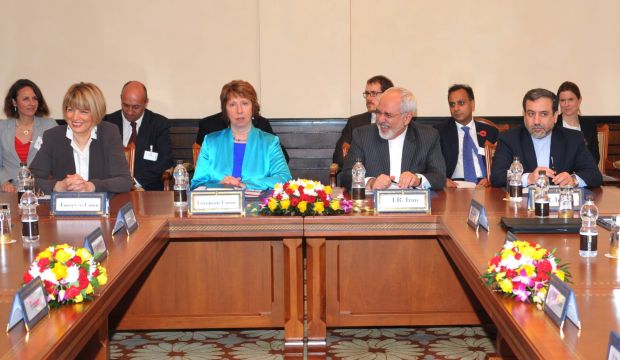
Iranian Foreign Minister Mohammad Javad Zarif (C-R) sits next to the EU's Catherine Ashton (C-L), during their meeting in the framework of negotiations on the Iranian nuclear file in Muscat, Oman, on November 11, 2014. (EPA/Hanid Al-Qasmi)
Muscat and Beijing, Reuters—Senior officials from Western powers and Iran started a one-day round of talks in Muscat on Tuesday, with a deadline for reaching a nuclear deal less than two weeks away and no imminent breakthrough in sight.
Tuesday’s discussions follow two days of meetings between Iranian Foreign Minister Mohammad Javad Zarif, US Secretary of State John Kerry, and EU envoy Catherine Ashton aimed at resolving years of dispute over Iran’s nuclear ambitions.
“There’s more work to do, clearly,” a senior State Department official said.
Iran’s top negotiator, Deputy Foreign Minister Abbas Araqchi, described the negotiations in Oman as “two days of very hard work,” the official IRNA news agency reported.
He added that he was “not in a position to claim that progress is achieved,” but sounded more upbeat in a subsequent interview with Iranian state television.
“There is a capacity to reach a deal by November 24 if there is a political will. At least we can reach a general agreement on major issues,” Araqchi was quoted as saying.
In Washington, State Department spokeswoman Jen Psaki said Zarif, Kerry and Ashton had held “tough, direct and serious” negotiations. She gave no details.
After leaving Oman, Kerry arrived in Beijing on Tuesday for an Asia–Pacific conference where, officials said, he and US President Barack Obama would confer on next diplomatic steps.
An agreement to curb Iran’s nuclear program, which Washington and its allies say may be aimed at building atomic weapons, would provide a historic foreign policy success for Obama. Iran, which says its nuclear work is for peaceful purposes, would see the removal of punishing economic sanctions.
But, as well as a tight deadline, the complex negotiations face political opposition in the United States, Iran and Israel.
In Berlin, German Foreign Minister Frank-Walter Steinmeier said: “The negotiations have now come to a point where I am optimistic that a conclusion is conceivable.
“We have never been closer [to an agreement] than right now. We have an opportunity . . . It is a make-or-break moment.”
En route to Beijing, Kerry spoke by phone with Israeli Prime Minister Benjamin Netanyahu, a second senior official said.
On Monday, Netanyahu denounced reported remarks by Iran’s Supreme Leader, Ayatollah Ali Khamanei, calling for Israel’s destruction, and said he had sent a letter to the foreign ministers of the P5+1 countries—the five UN Security Council permanent members plus Germany—who are leading the Iran negotiations.
